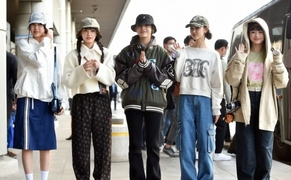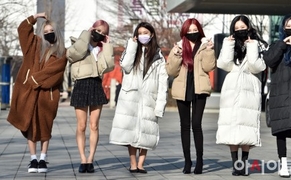 |
| (Left) Lee Nak-yon, who runs in Seoul’s key constituency of Jongno, campaigns for the April 15 general election, Sunday, with candidates running in Seoul’s Songpa and Gyeonggi’s Seongnam. (Right) The main opposition United Future Party chief Hwang Kyo-ahn, who runs in Jongno, campaigns for the election at Cheonggye plaza in Seoul./ Source: Yonhap News |
By AsiaToday reporters Lee Wook-jae
The crucial general election is only two days away. Rival parties are now focusing on variables that might determine the outcome of the election, such as voter turnout amid the COVID-19 outbreak, the fiercely contested districts, and swing voters.
A new survey conducted by Gallup Korea on behalf of the National Election Commission (NEC) on Sunday showed that 94.1 percent of 1,500 respondents said they would cast their ballots for Wednesday’s election. This is up by 5.3 percentage points from the past survey conducted for the 20th general election, which stood at 88.8 percent.
The early voting held on Friday and Saturday showed a turnout of 26.69 percent, the highest early voting rate ever. The voting intention of eligible voters was also found to be higher than that of the 20th general election. High voter turnout is not beneficial for a particular party, but turnout by generation has a significant impact on the outcome of the election. All parties were encouraged by the higher-than-expected voter turnout in early voting for the upcoming general election, with each arguing the outcome will be in their favor.
“We thought the COVID-19 pandemic would drop voter turnout in early voting, but it didn’t,” said Kang Chang-il, co-chairman of the ruling Democratic Party’s (DP) election committee. “Voter turnout for general election is expected to rise,” he said. “High turnout among young voters in early voting is expected to be in our favor. Today I visited regions in Gyeonggi as well as Yongsan district in Seoul, and the mood was nice,” he said with confidence.
“Internally, we think it was very encouraging. Voter turnout will be high in the upcoming general election,” said Kim Woo-suk, a senior spokesperson for the United Future Party’s (UFP) election committee. “The record-high voter turnout reflects the public sentiment to judge the government and keep the ruling party from acting totalitarian,” Kim said.
As the election is heating up, the outcome of the most-contested districts is being considered another variable. During the 20th general election, there were 13 battlegrounds with less than 1,000-vote difference between a winner and runner up. “In the upcoming general election, there will be super battles in more than 10 districts, and the victory of these constituencies will influence the result of the election,” said Kim Mi-hyun, head of R&Search.
More than 10 million centrists and swing voters also hold key to the election as the election is becoming a battle between progressives and conservatives. “The upcoming election has become a battle between the progressives and conservatives, the choice of swing voters has become more important. Swing voters will emerge as the final judges in the mostly-contested areas,” said political commentator Choi Young-il.
#April 15 #general election #turnout #swing voters #Democratic Party
Copyright by Asiatoday
Most Read
-
1
-
2
-
3
-
4
-
5
-
6
-
7





















